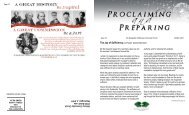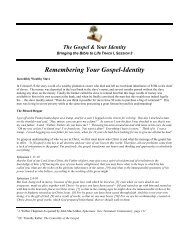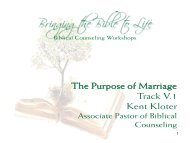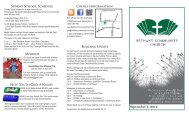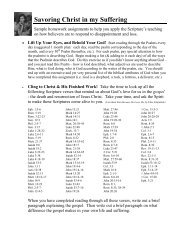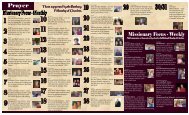That Hideous Doctrine by John Thomas - Bethany Community Church
That Hideous Doctrine by John Thomas - Bethany Community Church
That Hideous Doctrine by John Thomas - Bethany Community Church
You also want an ePaper? Increase the reach of your titles
YUMPU automatically turns print PDFs into web optimized ePapers that Google loves.
<strong>That</strong> <strong>Hideous</strong> <strong>Doctrine</strong> <strong>by</strong> <strong>John</strong> <strong>Thomas</strong><strong>That</strong> hideous doctrine of hell is fading. Howoften have you thought of it in the past month, forinstance? Does it make a difference in your concernfor others, in your witness? Is it a constant andproper burden?Most believers would have to say no. But theindividual isn’t the only one to blame. After all, thedoctrine no longer gets its float in the church parade;it has become a museum piece at best, stored in theshadows of a far corner.The reality of hell, however, demands we haulthe monstrous thing out again and study it until itchanges us. Ugly, garish, and familiar as it is, thisdoctrine will indeed have a daily, practical, andpersonal effect on every believer who comes to termswith its force.Our Lord’s words on the subject are unnerving.In Luke 16, He tells us of a rich man who died andwent to Hades (the abode of the unsaved deadbetween death and final judgment). From that storyand a few other revelatory facts, we can infer severalcharacteristics of hell.First, it’s a place of great physical pain. The richman’s initial remark concludes with his mostpressing concern: “I am in agony in this flame” (Luke16:24). We do not make enough of this.We all have experienced pain to some degree.We know it can make a mockery of all life’s goalsand beauties. Yet we do not seem to know pain as ahint of hell, a searing foretaste of what will befallthose who do not know Christ, a grim reminder ofwhat we will be spared from.God does not leave us with simply the mute factof hell’s physical pain. He tells us how real peoplewill respond to that pain. Our Lord is not beingmacabre; He is simply telling us the truth.First, there will be “weeping” (Luke 13:28).Weeping is not something we get a grip on; it issomething that grips us.Recall how you were affected when you lastheard someone weep. Remember how you weremoved with compassion to want to protect andrestore that person? The Lord wants us to know andconsider what an upsetting experience it is for theperson in hell.Another response will be “wailing” (Matt. 13:42).While weeping attracts our sympathy, wailingfrightens and offends us. It is the pitiable bawl of asoul seeking escape, hurt beyond repair, eternallydamaged. A wail is sound gone grotesque becauseof conclusions we can’t live with.A third response will be “gnashing of teeth”(Luke 13:28). Why? Perhaps because of anger andfrustration. It may be a defense against crying out oran intense pause when one is too weary to cry anylonger.Hell has two other aspects, rarely considered,which are both curious and frightening. On earth wetake for granted two physical properties that helpkeep us physically, mentally, and emotionally stable.The first is light; the second is solid, fixed surfaces.Oddly, these two dependables will not accommodatethose in hell.Hell is a place of darkness (Matt. 8:12).Imagine the person who has just entered hell—aneighbor, relative, co-worker, friend. After a roar ofphysical pain blasts him, he spends his firstmoments wailing and gnashing his teeth. But after aseason, he grows accustomed to the pain, not thatit’s become tolerable, but that his capacity for it hasenlarged to comprehend it, yet not be consumed <strong>by</strong>it. Though he hurts, he is now able to think, and heinstinctively looks about him. But as he looks hesees only blackness.In his past life he learned that if he looked longenough, a glow of light somewhere would yielddefinition to his surroundings. So he blinks andstrains to focus his eyes, but his efforts yield onlyblackness. He turns and strains his eyes in anotherdirection. He waits. He sees nothing but unyieldingblack ink. It clings to him, smothering andoppressing him.Realizing that the darkness is not going to giveway, he nervously begins to feel for something solidto get his bearings. He reaches for walls or rocks ortrees or chairs; he stretches his legs to feel theground and touches nothing.Hell is a “bottomless pit” (Rev. 20:1,2 KJV);however, the new occupant is slow to learn. Ingrowing panic, he kicks his feet and waves his arms.He stretches and he lunges. But he finds nothing.After more feverish tries, he pauses from exhaustion,suspended in black. Suddenly, with a scream hekicks, twists, and lunges until he is again tooexhausted to move.He hangs there, alone with his pain. Unable totouch a solid object or see a solitary thing, he beginsto weep.His sobs choke through the darkness. Theybecome weak, then lost in hell’s roar.As time passes, he begins to do what the richman did—he again starts to think. His first thoughtsare of hope. You see, he still thinks as he did onearth, where he kept himself alive with hope. Whenthings got bad, he always found a way out. If he feltpain, he took medicine. If he were hungry, he atefood. If he lost love, there was more love to befound.So he casts about in his mind for a plan to applyto the hope building in his chest.Of course, he thinks, Jesus, the God of love, canget me out of this.
He cries out with a surge, “Jesus! Jesus! Youwere right! Help me! Get me out of this!”He waits, breathing hard with desperation. Thesound of his voice slips into the darkness and is lost.He tries again. “I believe, Jesus! I believe now!Save me from this!” Again the darkness smothers hiswords.Our sinner is not unique. Everyone in hellbelieves.When he wearies of appeals, he does next whatanyone would do—assesses his situation andattempts to adapt. But then it hits him—this isforever.Jesus made it very clear. He used the samewords for “forever” to describe both heaven and hell.Forever, he thinks, and his mind labors throughthe blackness until he aches.“Forever!” he whispers in wonder. The ideadeepens, widens, and towers over him.The awful truth spreads before him like endless,overlapping slats: When I put in ten thousandcenturies of time here, I will not have accomplishedone thing. I will not have one second less to spendhere.As the rich man pleaded for one drop of water,so, too, our new occupant entertains a similarambition. In life he learned that even bad thingscould be tolerated if one could find temporary relief.Perhaps even hell, if one could rest from time totime, would be more tolerable.He learns, though, that “the smoke of (his)torment goes up forever and ever; and (he has) norest day and night” (Rev. 14:11 NASB).No rest day and night—think of that.Thoughts of this happening to people we know,people like us, are too terrifying to entertain for long.The idea of allowing someone to endure such torturefor eternity violates the sensibilities of even the mostsevere judge among us. We simply cannot bear it.But our thoughts of hell will never be asunmanageable as its reality. We must take thisdoctrine of hell, therefore, and make sure we arepractically affected <strong>by</strong> it.A hard look at this doctrine should first changeour view of sin. Most believers do not take sin asseriously as God does. We need to realize that inGod’s eyes and in His actual plan, each deserveseternal punishment in hell.We can actually learn, <strong>by</strong> comparison, to hatesin as God hates it. As the reality of hell violates andoffends us, for example, so sin violates and offendsGod. As we cannot bear to look upon the horrors ofhell, so God cannot bear to look upon the horrors ofsin. As hell revolts us to the point of hatred for it, soalso God finds sin revolting. The comparison is notperfect, but it offers a start.Second, the truth of hell should encourage ourwitness. Can we ever hear a sigh of weariness, seea moment of doubt, or feel pain without beingreminded of that place? In all honesty, can we seeany unbeliever, watch his petty human activities,realize what he has in store, and not be moved withcompassion? It encourages us to witness in wordand deed.<strong>That</strong> hideous doctrine may grip our souls in darkterror and make us weep, but let us be sure it alsoprompts us to holiness and compassion.



